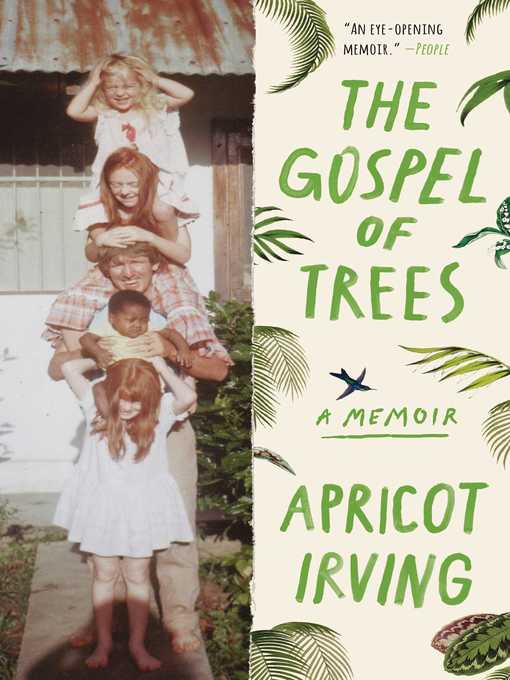
The Gospel of Trees
A Memoir
فرمت کتاب
ebook
تاریخ انتشار
2018
نویسنده
Apricot Irvingنویسنده
Apricot Irvingناشر
Simon & Schusterناشر
Simon & Schusterشابک
9781451690477
کتاب های مرتبط
- اطلاعات
- نقد و بررسی
- دیدگاه کاربران
نقد و بررسی

Starred review from December 11, 2017
In this lush, emotional debut memoir, Irving tells of her life as a missionary’s daughter in Haiti. Irving was born in California, but in 1982, at age six, her parents moved her and her sister to Haiti. Years of destructive colonization had left Haiti with severe deforestation, and her father began an ambitious mission to plant trees. Irving unflinchingly evaluates the consequences of well-meaning humanitarian work, which often included the perpetuation of oppressive colonial structures. She writes, “There is, in colonial literature, a recurring image: a foreign man, emboldened by his authority and by the lack of accountability, takes on a native mistress as a token of both his unquestioned power and his affection.” Amid the poverty in Haiti, Irving finds a “more complicated world where sorrow and beauty lived under the same leaky roof.” There, Irving wrestled with the prescriptions of her Christian beliefs, ultimately discovering a deeper faith in something else—that of beauty. “Beauty, it seemed, had been here all along: a wild summons, a name for God that did not stick in my throat.” This is a beautiful memoir that shows how a family altered by its own ambitious philanthropy might ultimately find hope in their faith and love for each other, and for Haiti.

January 15, 2018
A missionary's daughter recounts her childhood experiences in Haiti.Debut author Irving, a past contributor to This American Life, was 6 years old when her family first moved from Oregon to Haiti in the early 1980s. Together with her parents and two younger sisters, they spent much of the next decade striving to improve the living conditions of a region experiencing unrelenting social upheaval and drought. The family was led by the fierce determination of their agronomist father. "My father's vision for utopia," writes the author, "was agrarian: trees on every hillside, vegetables in every garden, water in every dry streambed. Seeds were small, but they could change the world." As the narrative progresses, the focal point becomes the author's conflicting relationship with her father and how it related to his idealistic vision for the country and his family. Irving draws from their various journals, each offering a distinct slant on her experiences of that time and place. She reveals how her parents' moral and religious zeal intersected and at times clashed with the harsh realities they faced each day in an uncompromising setting. "If, like my father, you suffer from a savior complex," writes the author, "Haiti is a bleak assignment, but if you are able to enter it unguarded, shielded only by curiosity, you will find the sorrows entangled with a defiant joy." In the lengthy final section, Irving tracks some of the changes in the region from her vantage point as a young woman returning after a 10-year absence. Later, she would assess further hardships in the capacity of a journalist assigned to cover the aftermath of the devastating 2010 earthquake. Throughout the book, Irving reveals a journalist's seasoned eye for nuanced regional detail, but her personal journey is surprisingly uninvolving and frequently bogged down by self-consciousness. A tighter edit, including a significant page-count reduction, may have resulted in a more authentically compelling story.A timely and often insightful perspective on modern-day Haiti woven into an overlong and banal family saga.
COPYRIGHT(2018) Kirkus Reviews, ALL RIGHTS RESERVED.

February 15, 2018
Writer and journalist Irving (This American Life) presents a reflective memoir focused on her childhood in Haiti with her Baptist missionary parents. Between the ages of six to 15, Irving mainly lived in a missionary compound in Limbe, northern Haiti, near the busy Good Samaritan Hospital. Irving's father was an idealistic agronomist, whose ambitious plans to help reforest Haiti, improve the soil, and reduce erosion often ended in terrible frustration, despite his dedication. Struggling with the challenges of missionary life and occasional Haitian political instability, Irving navigated a bumpy adolescence marked by episodes of family discord. Yet, the author was buoyed by adventure, beauty, resilience, and social connections found amid the missionary group and Haitian friends. Irving's work also sheds light on the underlying causes and consequences of Haiti's poverty and poor access to medical care. While providing a useful view of the inherent ethical and moral ambiguities of well-meaning but sometimes ineffective charitable interventions in Haiti, Irving's meandering autobiography often feels unfocused and circuitous. VERDICT Best suited to serious readers interested in Haiti or the lives of missionary children and families.--Ingrid Levin, Salve Regina Univ. Lib., Newport, RI
Copyright 2018 Library Journal, LLC Used with permission.

























دیدگاه کاربران